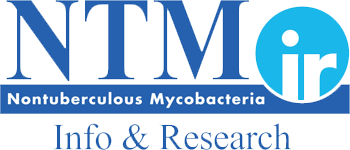Damage to lung tissue can occur for a number of reasons. This damage is often an underlying vulnerability which leaves people susceptible to NTM lung infections.
In addition to illnesses such as pneumonia, pseudomonas and aspergillus infection, other diseases, called co-morbidities, may make someone susceptible to NTM lung infection.
Alpha-1 Antitrypsin Deficiency is a genetic disorder caused by defective production of a protein called Alpha-1 Antitrypsin, causing decreased activity of the protein in the lungs, and a buildup of the protein in the liver. Alpha-1 Antitrypsin Deficiency can cause serious lung and/or liver damage. Some NTM patients are diagnosed with Alpha-1, and some Alpha-1 patients develop and NTM lung infection.
Autoimmune pulmonary alveolar proteinosis (aPAP) is a rare lung disease that is caused by an abnormal accumulation of surfactant sediment in the alveoli (air sacs), leading to an impaired gas exchange between the lungs and blood. The three main causes of PAP are autoimmune, congenital, and secondary. Click here for more information in aPAP.
COPD (Chronic Obstructive Pulmonary Disease) is a generalized designation for diseases involving persistent airway obstruction such as emphysema, chronic bronchitis and bronchiectasis. Click here for more information on bronchiectasis.
Cystic Fibrosis, an inherited (genetic) chronic lung disease affecting the lungs and digestive system. There is significant overlap between CF and NTM patients. Click here for more information on Cystic Fibrosis.
Emphysema is a chronic obstructive pulmonary disease (COPD) in which the alveoli or small airways of the lungs are damaged, which makes breathing more difficult. Emphysema is usually caused by smoking.
Gastroesophageal Reflux Disease (GERD) is spillage of material from the mouth or stomach into the lungs). It is widely believed that this condition may contribute to NTM lung infections and/or bronchiectasis in some patients.
Gram-negative infections. Gram-negative bacteria are a group of germs that can cause respiratory infections. Some NTM patients also get gram-negative lung infections such as pseudomonas, achromobactin, and klebsiella. These infections are treated with antibiotics and airway clearance.
Immune system problems can also leave patients vulnerable to NTM lung infections. These problems may include immune dysregulation disorders. Immune dysregulation is an unrestrained or unregulated immune response, an inappropriately robust or weakened immune response. Other immune dysfunction may be caused by immunosuppressive treatments like chemotherapy or drugs used to treat diseases like Sjogren’s, Rheumatoid Arthritis, Crohn’s disease, or ulcerative colitis.
PCD (primary ciliary dyskinesia) is an inherited disorder of motile (moving) cilia. PCD is also sometimes referred to as Kartagener syndrome (PCD with situs inversus) or immotile cilia syndrome. Motile cilia are required to keep the lungs, sinuses and ears free of organisms and debris that can cause infection and disease. A person with PCD experiences chronic, recurrent infections in the lungs, ears and sinuses due to the loss of ciliary activity in those areas.
